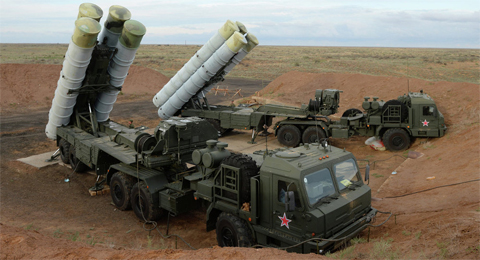Putin tells Netanyahu he rejects Israeli version of events - US warns of 'significant escalation'
MOSCOW: Russia announced yesterday it will supply an S-300 surface-to-air missile system to Syria in two weeks despite strong Israeli objections, a week after Moscow blamed Israel for indirectly causing the downing of a Russian military plane in Syria. The White House said it hoped Russia would reconsider the move, which US National Security Advisor John Bolton called a "significant escalation" of the seven-year war.
Russian Defense Minister Sergei Shoigu said Moscow had in the past obliged Israel by refraining to supply Syria with the system. But last week's crash, which killed 15 Russian service members, had forced Russia to take "adequate retaliatory measures" to keep its troops safe. "A modern S-300 air defense missile system will be transferred to the Syrian armed forces within two weeks," he said. The system will "significantly increase the Syrian army's combat capabilities," he said. Under the new measures, "in regions near Syria over the Mediterranean Sea, there will be radio-electronic suppression of satellite navigation, on-board radar systems and communication systems of military aviation attacking objects on Syrian territory", Shoigu said.
President Vladimir Putin discussed the decision by phone yesterday with Israel's Prime Minister Benjamin Netanyahu, the Kremlin said. "The information provided by the Israeli military...runs counter to conclusions of the Russian defense ministry," the Kremlin said of the call, adding that the actions of the Israeli pilots had led to the plane being targeted by Syrian air defense systems. "The Russian side proceeds from the fact that the actions by the Israeli air force were the main reason for the tragedy," a statement said. Putin told Netanyahu that the measures had been taken to prevent any threat to Russian troops in Syria.
"Prime Minister Netanyahu said that transferring advanced weapons systems into irresponsible hands will increase the dangers in the region, and added that Israel will continue to defend its security and its interests," Netanyahu's spokesman Ofir Gendelman said on Twitter after the call between the leaders. Netanyahu also said he told Putin that Israel would continue to protect its security and interests. The Israeli leader also agreed with Putin on continued coordination between the two countries' armed forces.
Russia, which fights in Syria to support the government, has said Syria shot the IL-20 surveillance plane down by mistake shortly after Israeli jets hit a nearby target. Moscow blamed Israel for creating dangerous conditions that caused the crash. Israel, which has struck Syria scores of times during the war, said after the incident that it would work to improve "deconfliction" of its missions with Russian forces, but would not halt them. It has long lobbied Moscow not to provide the S-300 to Syria, fearing this would hinder its aerial capability to strike buildups of Iranian and Hezbollah forces in Syria.
Kremlin spokesman Dmitry Peskov told reporters the decision to supply the weapons was not directed at any third country. "Russia needs to increase safety of its military and it should be clear for everyone," he said. But he also repeated Moscow's accusations that Israel was to blame for the plane's downing: "No doubt that according to our military experts, deliberate action by Israeli pilots was the reason for the tragedy and this cannot but harm our (Russia-Israeli) ties."
Syrian President Bashar Al-Assad's office said: "President Putin held Israel responsible for bringing down the plane and informed President Assad that Russia will develop Syria's air defense systems." Russia in April had hinted that it would supply the S-300 to Assad's government despite Israeli objections. The missile system, originally developed by the Soviet military, but since modernized and available in several versions with different capabilities, fires missiles from trucks and is designed to shoot down military aircraft and short- and medium-range ballistic missiles.
"We think introducing the S-300s to the Syrian government would be a significant escalation by the Russians ... and something that we hope, if these press reports are accurate, they would reconsider," Bolton told reporters. "There shouldn't be any misunderstanding here ... The party responsible for the attacks in Syria and Lebanon and really the party responsible for the shooting down of the Russian plane is Iran," he said.
Bolton warned that if the Syrian government used chemical weapons again, the US response would be significant. "If in fact they make the mistake of using chemical weapons again, the retaliation would be much stronger than before and would have the intended effect of creating structures of deterrence that they never do it again," he said. Bolton said the US was doing everything it could to ensure Syria did not use chemical weapons and had pressed Russia about the issue as well.
Bolton said a political process was needed but said Russia's plans on the missile system made that difficult. He said US troops would stay active in Syria as long as Iran was involved. "We're not going to leave as long as Iranian troops are outside Iranian borders, and that includes Iranian proxies and militias," he said.
Amos Yadlin, a former head of Israeli military intelligence who now directs Tel Aviv University's Institute for National Security Studies, called the accusation that Israel played a role in the crash "fake news...meant to assuage diplomatic pressures and cloud the responsibility of Syrian and Russian officers for downing the plane". "Supplying S-300 increases risk by unprofessional Syrian operators first and foremost to the Russian air force, to Israel, the United States and the coalition as well as to civil aviation. Israel has been preparing for this threat for 20 years and will know how to handle it," he tweeted.
Alexander Khramchikhin of the Moscow-based Institute of Military and Political Analysis said the S-300 could "seriously affect Israel's ability to carry out its strikes in Syria". Dmitri Trenin, director of the Carnegie Moscow Center and a former colonel in the Russian army, said the S-300 would make Israel "more careful in the vicinity of Russian assets". - Agencies










